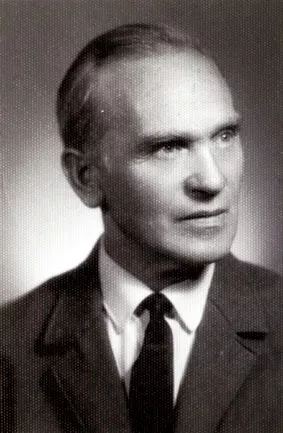Romana Holder’s friend’s husband
This is the husband of my friend Zaba. I would prefer not to give his name, because I have called him an anti-Semite. The picture was taken in the 1950s or 1960s. I received it from Zaba or their daughter.
I got out of the Ghetto in 1942. At first I was in hiding in various places in Warsaw. Afterwards I wrote to my brother saying that I wanted to get back to the Ghetto. He wrote back that a woman woud come and take care of me. And indeed, a woman came. She was a friend of my brother's, Zaba, from Konskowola [around 100 km south-east from Warsaw]. I have no idea where he met her.
So I went to Zaba's, to Konskowola and I actually was very comfortable there. She was a nurse, 6 years older than I was; before the war she took nursing courses in Warsaw. Her mother was Czech, a lovely woman. Zaba's husband was a railway man. They had a daughter Ewa who was 2 or 2-and-a-half when I came. Zaba was a brave woman, and her husband was a sissy. She took care of me, she hugged me, she ruled that house so that he didn't have much say, lucky for me… We lived in a brick house next to the railway tracks, by the crossing. When they started deporting the Jews, I could see the boxcars with people in the windows. Once I thought I saw my brother, but I don't know if it was him… And when those trains were going to Majdanek, then Zaba's husband-a kind, polite man-said that one good thing Hitler was doing was what was happening to the Jews. I told Zaba about that, and she said 'Come on, he doesn't know what he is saying.' That was the end of it, but it stayed with me. Anyway, it wasn't good company for me. Zaba's sister-in-law, Hela, a bad one, took an astrakhan fur coat from her Jewish friend and denounced her to the gendarmes. Why didn't she denounce me? When one of Zaba's friends came over I had to spend the whole time under the bed. So it was pretty interesting over there…
Everybody around must have known I was Jewish, but nobody said anything. I was there as a cousin; the little girl called me 'auntie.' But the news spread among the railway men who I was. One young one, very handsome, said to me 'I'd find you attractive even if you were Jewish.' And another time, when Zaba wasn't home and I couldn't start the stove-it was a coal stove-I went to the office where that guy worked and asked him for help. Apparently he knew right away that I was Jewish [according to a pre-war stereotype held by some Poles, Jewish women didn't know how to start a fire in a stove]. It was only after the war that I found out why.
I spent two years with Zaba, from 1942 till the end of the war, when Lublin was freed [July 1944], possibly before Warsaw was. When the Russkies came, they wanted to arrest Zaba's other brother, Edward, who was the mayor. People were denouncing him, because apparently he was stealing their cows and produce. To put it short, he was a son-of-a-bitch. When they came to get him he hid somewhere. But the people who he'd rubbed up the wrong way came after him and there was a court case in Lublin after the war. And I was the main witness for the defense. I said in court: 'I can't say anything against Edward, because I am Jewish and this family saved my life.' I did it only for Zaba and her mother, not anybody else from that family. Because of what I said he was released, after having been held for a year and a half.
After the war I helped Zaba-my husband had connections, so he arranged for an apartment in Warsaw and a job at the hospital for Zaba's daughter. After Zaba died, in 1973, her husband wanted me to help him get into the veterans' union. How could I? I didn't have any connections there. So I told him there was this tree campaign. And he got the title of ‘Righteous Among the Nations.’ He accepted it in his and Zaba's name.






















